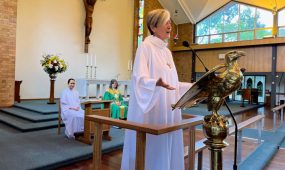Generosity and grace…well-seasoned by wisdom
Homilies & Addresses
“Somehow in Christ we are called to a new way of relating that is deeply grounded in the relationship we have with God. It’s not the transactional: you do something to me or for me, and – in response – I do something to you or for you. Instead, I think we are called to proactive generosity and grace…well-seasoned by wisdom,” says Bishop Cam Venables in this recent homily

I recently reviewed a survey that helps congregations think about how to welcome people when they come to church. It is tempting to think that a good handshake and a smile are all that are needed, but, the survey helpfully identified additional things to be mindful of even before we enter the church building! ‘Do we have a website or Facebook page, and does the information on these explain clearly who we are, what we believe, and what time we’re open?’ – is the first question. ‘Are the Website and Facebook photos of church buildings, or of people happy to be together?’ is the second question! Clearly, there’s more to welcome than a smile and the word ‘G’day!’
The survey goes on to ask if it’s easy to park your car near the church? Is there disability access? And…are the toilets clearly signed?! Are there welcome cards for new people, and is there a system that ensures they will be contacted after their visit? Before, are there people at the door who will make visitors feel welcome – whether they’ve been previously attending church for years, or if they’ve never been to church?
However, the survey does not talk about the significance of community culture, which is interesting. I think a church could have the most engaging person at the door, and an award-winning website, but if the gathered community does not love each other, and are not interested in visitors then, it is unlikely a new person will want to come back.
Today’s reading from Ephesians speaks strongly about church culture, and I wonder what behaviours were being addressed. Even though the words were written to a church community two thousand years ago, I think they can still speak uncomfortable truth. In that time people could relate well or relate poorly – which is surely true to the lived experience of community in our time. There were some behaviours and attitudes which were creating division, and these were addressed directly: ‘…put away falsehood and speak the truth!..’ the writer said. ‘…don’t let the sun go down on your anger!’ ‘Let no evil talk come out of your mouths…’ and ‘…put away bitterness and wrath and anger and wrangling and slander… and all malice…’ Which, in summary, could read: Don’t lie! Don’t gossip! Don’t harden your hearts! And, don’t be forever angry!’
Advertisement
The author of Ephesians does not leave the community wondering what behaviours they should practise as he exhorted them to: ‘…speak the truth…’ ‘…share with the needy…’ ‘…speak words of grace…’ ‘…and be kind to one another, tender hearted, forgiving one another, as God in Christ has forgiven…’ ‘be imitators of God..’ ‘…and live in love…’ Surely there is wisdom for each of us in this – because we each have a part to play in creating, maintaining, and transforming community culture. No matter how small our Bible study group, or Morning Prayer congregation might be; and no matter how large our Sunday gathering…is there evidence of a culture that is shaped and enabled by Christian faith? Do we speak the truth, and share with the needy? Do we forgive each other? Do we practice kindness…and live together in love?
We know the wisdom of these things, but we’re human beings with personalities that bump into each other, so inevitably there will be conflict along the way. Conflict is normal in human relationships, so it’s what we do with it that’s important. Do we pretend it’s not happening and allow things to fester? Do we run away, and hope that in time things will cool down? Are we frightened that in naming bad behaviour there will be rejection and ridicule?
Advertisement
Dealing with, and managing, conflict is tough…but is a necessary part of community life.
The Roman Catholic Parish in Springfield has a large and growing congregation and the ministry team who serve there have an annual practice that I think is worth considering. At the beginning of each year they collectively identify behaviours that are healthy and behaviours that are toxic. Having agreed to these they then give permission for toxic behaviours to be called out if they are observed or perceived during the year so that the culture of the Parish, created by the leaders, is as healthy as it can be.
Teachers will often do something similar with their classes at the beginning of each year…so, maybe Parish Councils could do the same after being elected at the Annual General Meeting next year. The guide-book called ‘Being Together’ produced by the National Anglican Church is a great resource to help with this and our Diocese has developed resources that draw from this.
You may be thinking that this is idealistic and impractical and that it is simply in our DNA to fight, or withdraw, or just stew on things! But, the writer to the Ephesians suggests that Christ calls us to do things differently. It was Christ who suggested that we, ‘Love our enemies, and pray for those who persecute us…’ (Matthew 5.44). Who commanded that we love one another (John 15.12), and who prayed, ‘Forgive them Father for they do not know what they are doing…’ (Luke 23.34).
Somehow in Christ we are called to a new way of relating that is deeply grounded in the relationship we have with God. It’s not the transactional: you do something to me or for me, and – in response – I do something to you, or for you. Instead, I think we are called to proactive generosity and grace…well-seasoned by wisdom.
Let me offer some questions for further reflection:
- How would you describe the community, or congregational, culture you are part of?
- What are the good things, and what are the things that are less good?
- What is one thing that would be helpful to improve the culture?
- And, how could you make that happen?
Would you please join me in prayer:
Gracious God, we give thanks for the many ways that you nourish and nurture us in life and in faith. We give thanks for the opportunity to think about the impact our behaviour has on the lives of others and ask for insight about this. We pray in the name of the one who shows us the way, Jesus Christ our Lord. Amen





